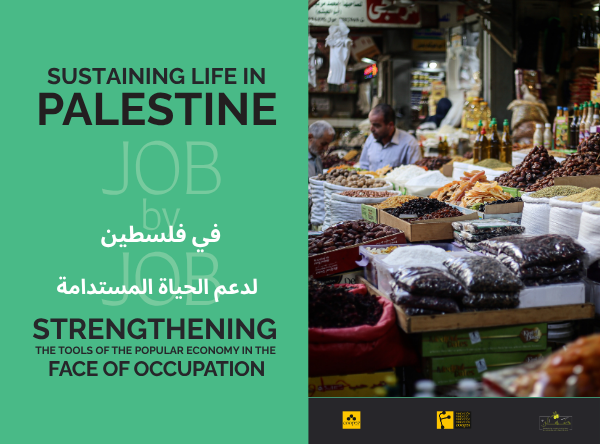Share this post:

Running a bakery, driving a taxi, or weaving are daily activities that support the local economy in Palestine. Run by small entrepreneurs, families, or individuals, Palestinians are every day risking their businesses due to the ongoing situation.
Microfinance institutions have always played a crucial role in places where the popular economy sustains daily life. Palestine is one of those places—a land where ancient trades are still carried out by its people, and where economic activity gives life to the communities that depend on it.
However, in places where there’s an active occupation or ongoing violence, the risk of credit is much harder to assess. Sometimes businesses are destroyed or people are displaced without warning, and Palestinians are unable to repay their loans.
In response, the DAMAN initiative was created to support microcredit institutions and small businesses in Palestine, covering up to 80% of the unpaid debt when non-repayment is directly caused by war or occupation. In this context, Coop57, a member of FEBEA, has launched a fundraising campaign to help strengthen DAMAN’s solidarity-based credit guarantee system to support people at risk.
Over a year of military escalation and siege on Gaza, Palestine is experiencing an unprecedented economic crisis marked by the collapse of GDP per capita, widespread poverty, and a sharp rise in inflation and unemployment. The Gaza Strip, in particular, has suffered relentless devastation since October 7, 2023, with unemployment levels amounting up to 80%.
Income-generating activities have been constrained by the destruction of 66% of Palestinian infrastructure, with severe damage to housing, hospitals, water systems, and commercial structures undermining productive capacity. Restrictions on trade and movement have also played a major role in the economic collapse of Palestine, with tight controls on imports and exports suffocating key sectors such as agriculture and manufacturing. Combined with limited access to essential resources and widespread forced displacement, these factors have driven year-on-year inflation to 248% as of August 2024. As a result, livelihood opportunities have been drastically reduced, triggering a deep crisis of economic sovereignty.
Even in light of the current situation, the Palestinian popular economy continues to rely on its own tools for resilience. In this sense, Palestinian microfinance institutions play a key role in sustaining the popular economy: they offer small-scale funding for essential investments that help individuals or families launch or rebuild their businesses. These loans are often based on community trust rather than formal guarantees and are tailored to each borrower’s capacity to repay. They support key sectors such as agriculture, local trade, services, and crafts.
This support is particularly relevant in a context where approximately 92% of employment in Palestine is linked to small businesses. For a large part of the population, these microenterprises are not only a source of income but the foundation of everyday life. Microfinance, in this sense, helps sustain essential economic activity in the absence of more stable or large-scale alternatives.
Research shows that access to microfinance contributes to business continuity, income generation, and household resilience. Still, Palestinian microfinance institutions operate under constant strain and loan funding shortages remain a systemic risk. Even if microcredit institutions are part of broader mutual support networks that underpin daily life, they also need a degree of protection—particularly in the form of financial guarantees—to continue functioning in such a volatile environment. This is where solidarity-based credit guarantee network, DAMAN, comes into play.
Daman is a Palestinian nonprofit initiative that provides up to 80% insurance coverage for highly vulnerable borrowers —particularly women, youth, and small or micro-entrepreneurs—who have been directly affected by policies and actions linked to war or occupation. It is a partnership between the Arab Center for Agricultural Development (ACAD), the Palestinian Business Women’s Association (ASALA), REEF Finance and the International Solidarity for Development and Investment (SIDI). Operating across the West Bank, East Jerusalem, and Gaza, Daman supports borrowers facing economic hardship due to a range of occupation-related circumstances. These include restrictions on access to local and international markets, the death of a family member as a result of the conflict, imprisonment for political reasons, the partial or total destruction of their business infrastructure, or the confiscation of land tied to their project.
At its core, ethical finance seeks to align financial practices with principles of social justice, environmental responsibility, and human dignity. It challenges the logic of profit maximization by placing people and communities at the center of financial decision-making. In this context, initiatives like Daman reflect how ethical finance can operate in practice—ensuring that financial tools serve the people, not markets. By supporting economic life in occupied Palestine through solidarity-based guarantees, Daman shows that finance can be a vehicle for care, resilience, and collective responsibility, even in the most difficult conditions.
The FEBEA member, Coop57, has launched a fundraising campaign to strengthen DAMAN’s solidarity-based credit guarantee system with the goal of raising 70.000€ between May and September 2025. This initiative by an Ethical Finance organization exemplifies what FEBEA members do best: developing financial solutions to support those in need — and in this case, those at risk.
If you reside in Spain, you can support Coop57 fundraising, however, if you live somewhere else, you can support Daman’s crowdfunding.
This campaign reclaims credit and finance as tools for redistribution, autonomy, and collective care. It’s not just a gesture of support—it’s a tangible act of solidarity that strengthens the fabric of everyday resistance. Every loan protected, every trade sustained, is a step toward economic sovereignty. Every act of resilience helps keep a piece of Palestine society alive.